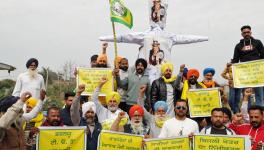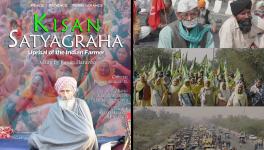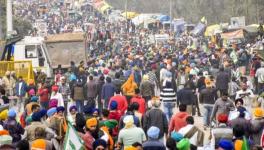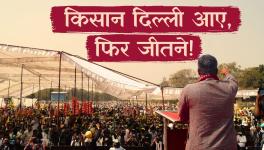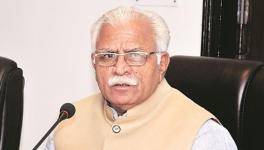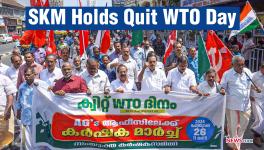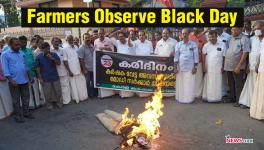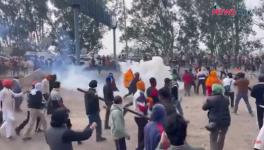Internet Shutdowns: Revival of British Divide-and-Rule Policy?
The Jallianwala Bagh massacre, in which General Dyer opened fire on a peaceful assembly, resulted in the death of more than a thousand people in 1919. This incident, that shook the nation was a result of the inhumane colonial British policy that sought to divide us and continue to rule. Today, we are witnessing a revival of the same divide-and-rule policy, enforced through systematic spread of misinformation and the forcible imposition of internet shutdowns.
On January 26, farmers of India undertook a massive one lakh tractor parade from all over the country towards the national capital. This is the culmination of the long and arduous struggle they have been leading since November 2020 against the new Farm Laws which seek to privatise the Indian agriculture sector and destroy the farmers’ livelihood.
On the day of the tractor parade, the farmers were stopped from entering the routes planned for the rally, attacked with teargas shells and treated with nothing but brutal violence injuring many in the process. During the rally and in the aftermath, the central government suspended internet in parts of Delhi followed by the state government of Haryana suspending internet services in 17 (out of 22) districts. SMS services have been stopped too.
In 2019, India topped the list of countries that shutdown Internet with 121 shutdowns.
What do Internet Shutdowns Achieve?
The govt says that it is suspending the Internet in order to protect ‘law-and-order’ and regulate misinformation on social media. If that is the intention, internet shutdowns are vague as they cannot tackle specific cases of misinformation and are completely ineffective tools as they completely block exchange of information. Regulation of social media and spread of fake news can be achieved by implementing a strong data protection framework with precise laws and commensurate measures. No effort has been made in this regard even as the spread of misinformation on platforms like WhatsApp and Facebook continue to plague us. Moreover, internet shutdowns make it difficult for people to communicate and avail necessary resources such as food and medical supplies, of which the farmers are in great need.
Internet shutdowns also violate freedom of speech that is guaranteed in the Constitution of India. The Supreme Court of India ruled that an undefined restriction of internet services would be illegal and that orders for internet shutdown must satisfy the tests of necessity and proportionality. The court said that, the government must establish a possible goal and assess the existence of any alternate mechanism in furtherance of the goal and impose a shutdown only as a last resort. The goal of ‘maintaining law-and-order’ during a peaceful protest and the hasty imposition of the shutdown—both go against the ruling of the apex court.
Misinformation? No, Mal-information.
While the govt cautions us of misinformation, what we are indeed seeing is a case of rabid mal-information. This is nothing but misinformation, deceit purposely cloaked as information and news. The recent accusations that the farmers movement is a front for Khalistanis and that they are Pakistani terrorists, the media-trial on the death of the actor Sushant Singh Rajput orchestrated on TV channels, are the prime examples of mal-information. It has become impossible for anybody to access even a glimmer of objective truth because we are bombarded constantly with a barrage of mal-information by TV news channels. The seeming choice we have in these channels is but an illusion as all these channels are owned by a handful of media corporations. Reacting to the farmers protesting against Reliance, the company said that ‘it had nothing to do with the farm laws.’ It is evident that this statement was a lie and the farmers were impeccably prescient in this issue as Network-18, the largest news network, is owned by Mukesh Ambani, Asia’s richest man, with all its media outlets, enthusiastically participated in maligning the farmers’ movement.
The Internet as it exists today is a more democratic medium than the TV, but let us make no mistake, the digital monopolies act as restrictive and manipulative gateways to it. With Google showing each individual different information for the same query, we are already put in ‘filter-bubbles’ filled with repetitive content. Facebook on the other hand has recently blocked without any warning the page of ‘Kisaan Ekta Morcha’, which represents the farmers’ movement and has lakhs of followers. Whatever information that could seep out of an ever-tightening filter can be censored arbitrarily lawlessly by these social media companies.
While the mal-information is being systematically disseminated and broadcasted, the internet shutdown makes it extremely difficult for the farmers to provide any information about the events unfolding during the protest.
Internet Shutdowns in Age of Mass Surveillance
Not only was internet suspended in the midst of the protest on Republic Day but, this was also accompanied by anti-riot drones. Suppression of freedom of speech is not the only issue here but, stifling farmers’ voices while deploying military-grade surveillance on them coupled with tracking their online activity creates a situation where the protesters can neither coordinate among themselves nor communicate with people outside the location. At the same time, it gives the government an unprecedented control over the protesters and the narrative.
Our online social media activity includes the Facebook pages we like, the friends we talk to, the events we attend, the places we visit, the news we read, the terms we search, the videos we watch and much more. All this activity is used to build a profile on us. With this profile, and the profiles of those who are associated with us, our behaviour can be predicted accurately. This is the data that the social media companies use to show us advertisements and sell us products.
The government can anticipate the immediate future of the situation and control it whereas the farmers are kept in the dark.
The farmers need not be enclosed by walls for the govt to exert this level of control, just by suspending the internet they can largely achieve it. This is a prison in all but name.
Internet Shutdowns as a Tool to Crush Protests
The Anarchical and Revolutionary Crimes Act of 1919, popularly known as the Rowlatt Act, was introduced to crush even the whisper of independence. The British formulated this to label any and every activity, even a peaceful gathering, as a ‘conspiracy’ and used to justify numerous arrests, impose severe restrictions and suppress any activities of the Independence movement brutally. Crucially, press freedom was severely curtailed and no information about any of these activities was allowed to be published:
“…The spread of revolutionary propaganda must be checked forthwith; violent and seditious crimes must be promptly punished; the men behind them must be removed and interned; the mischievous activities of newspapers must be curtailed; and every precaution must be taken to ensure that the poisonous teaching of open rebellion was kept both from the army and from the people…” - General O’Dwyer, Lieutenant Governor of Punjab, quoted in the The Anarchical and Revolutionary Crimes Act of 1919.
The restriction on the Independence movement became indistinguishable with the surveillance and censorship imposed on the people. Even under such repression, protests continued with vigour and a hunger for national integration and unity. Hiding under the shadows of this act, On April 13, 1919, General Dyer and his troops opened fire in Jallianwala Bagh on a peaceful gathering resulting in the death of around 1000 people.
The horrific incident of Jallianwala Bagh massacre was not an aberration or an isolated incident but it was a result of the British policy to keep India in shackles at all costs. The mass firing on peaceful protesters was in fact repeated by the British in Ireland and Kenya. The Jallianwala Bagh massacre itself is an act of brutality carried out as a result of colonial determination to divide the increasing unity of the Indian people across the religious differences and rule them in ensuing chaos.
The divide-and-rule policy was then carried out to create chasms between Hindus and Muslims. Today, these Internet shutdowns and mal-information campaigns intend to make it impossible for us to know the ground truth and interact with the farmers. It precludes the possibility of an ‘informed’ citizen which is the foundation of our democracy. With allegations that the whole movement being a conspiracy, denouncing farmers for their supposed lack of patriotism, attributing violence to a peaceful protest, today’s situation is reminiscent of the days of colonial past. The new divide-and-rule policy effectively divides the citizens at large and the farmers who are struggling for their rights. That the government chooses to divide us on Republic day while boasting empty words of patriotism is a cruel irony.
Censorship of press suppresses freedom of speech by arbitrarily deciding what can be published and what cannot be. An internet shutdown during a protest is a blanket suppression of the voices of protesters. It is not just a censorship; it is a declaration of a martial law on information. It is effectively, an imposition of Emergency. At this time, it falls on us to oppose this inherently divisive move and a terrible restriction on the people. We have to demand that the shutdowns be lifted and that further shutdowns are never imposed.
Get the latest reports & analysis with people's perspective on Protests, movements & deep analytical videos, discussions of the current affairs in your Telegram app. Subscribe to NewsClick's Telegram channel & get Real-Time updates on stories, as they get published on our website.









